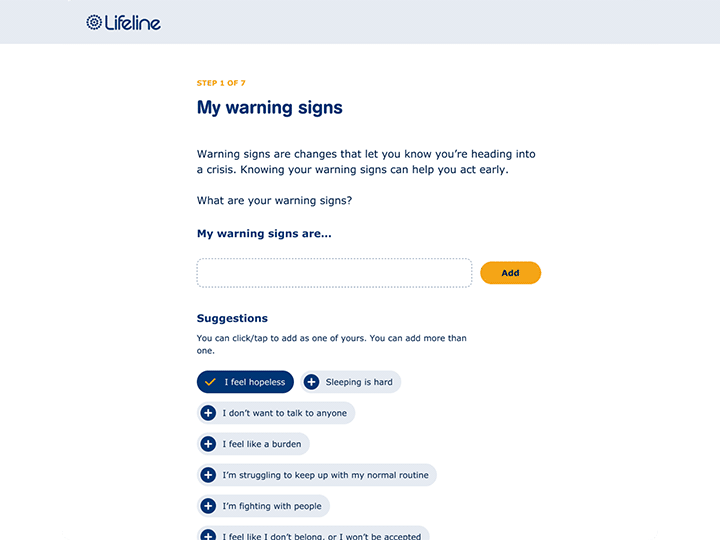It seems life has been overwhelming and very distressing for you lately.
Based on your answers to our questions, you’ve been experiencing a very high level of distress over the past 4 weeks.
We’re sorry things have been really tough for you recently.
We’re sorry things have been really tough for you recently.


What this means
Most people who are in the very high distress range are likely to be experiencing mental health conditions such as depression and anxiety, or thoughts of suicide.
You may feel worthless and unable to control negative thoughts. It may feel like daily tasks are impossible.
It's important to remember that this result is not a diagnosis. Only a mental health professional can give you a diagnosis.
When you’re in crisis, you may need professional support right away. Please know you are not alone.
You may feel worthless and unable to control negative thoughts. It may feel like daily tasks are impossible.
It's important to remember that this result is not a diagnosis. Only a mental health professional can give you a diagnosis.
When you’re in crisis, you may need professional support right away. Please know you are not alone.
What to do now
We strongly encourage you to get support now. Anxiety and depression don’t usually go away on their own. You’ll need support to help you feel better, and to stop you from feeling worse.
Many of us find it hard to ask for support, but it can make a real difference having someone to talk to.
You can talk to someone close to you that you trust. Or you can talk to us – online or on the phone. We can also help you find ongoing professional support.
Many of us find it hard to ask for support, but it can make a real difference having someone to talk to.
Connect with someone who can support you
You can talk to someone close to you that you trust. Or you can talk to us – online or on the phone. We can also help you find ongoing professional support.
Talk or chat online to our counsellors
The Beyond Blue Support Service is available 24/7 for free, confidential counselling (local call costs apply).
Our counsellors are ready to listen and help you find the support you need. No feeling or issue is too small or too big. Most calls or chats last around 20 minutes.
Our counsellors are ready to listen and help you find the support you need. No feeling or issue is too small or too big. Most calls or chats last around 20 minutes.
What to do next
Consider seeing a mental health professional
Mental health professionals like a GP, psychologist, psychiatrist or counsellor can review your symptoms and help you decide what support you need.
A GP, psychologist or psychiatrist may diagnose you with a mental health condition.
A diagnosis can sound scary to some people, but it can help you understand what you’re going through. It can also help you access:
- Medicare rebates, with a mental health treatment plan
- treatment options, including therapy and medication.
You can bookmark or print this page and take it to your appointment.
Already seeing someone?
If you’re already receiving professional help and you’re worried things aren’t getting better, we encourage you to keep reaching out.
There are a range of effective treatments and health professionals. Sometimes it can take time to find the support that’s right for you.
Explore the range of options at Get mental health support.







